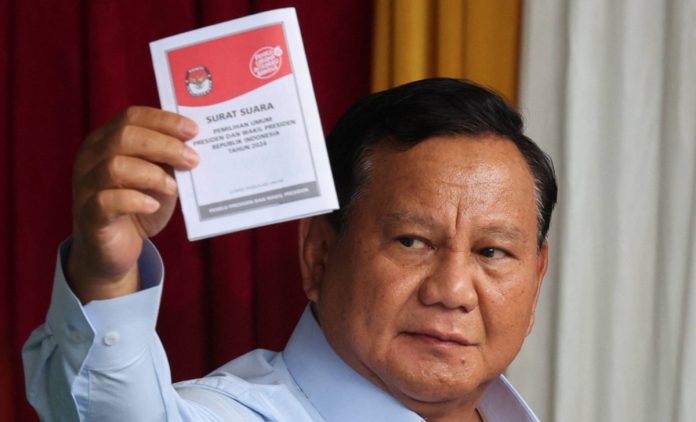Prabowo Subianto, the former general and son-in-law of Indonesia’s long-time authoritarian leader Soeharto, appears to be on the cusp of assuming the presidency of Indonesia, marking a significant turn in the nation’s political landscape. Despite a contentious past marked by allegations of human rights abuses and electoral controversies, Prabowo’s recent electoral success signals a remarkable turnaround in his political fortunes. As Indonesia awaits the official confirmation of the election results, it is imperative to examine the factors behind Prabowo’s resurgence and the potential implications of his presidency for the nation.
One pivotal factor contributing to Prabowo’s convincing victory is the absence of the immensely popular incumbent, Joko “Jokowi” Widodo, from the electoral race due to term limits. Jokowi’s decision to throw his support behind Prabowo Subianto, despite their previous electoral rivalry, lent considerable momentum to Prabowo’s campaign. The strategic alliance between the two figures, symbolized by the inclusion of Jokowi’s son as Prabowo’s vice-presidential running mate, garnered significant support from voters who viewed it as a continuation of Jokowi’s policies.
The shifting political landscape, characterized by Jokowi’s unexpected support for Prabowo and the subsequent decline of traditional power structures, underscores the complex dynamics within Indonesian politics. The fragmentation of political allegiances and the emergence of new alliances, such as the coalition backing Prabowo, signify a departure from established norms. Moreover, Prabowo’s victory deals a blow to established political parties, particularly the PDI-P, signaling a potential realignment of political forces in the country.
However, Prabowo Subianto’s ascent to power is not without controversy. Allegations of human rights abuses and electoral misconduct have cast a shadow over his candidacy, prompting concerns both domestically and internationally. The prospect of democratic regression under Prabowo’s presidency raises apprehensions regarding the erosion of democratic institutions and individual freedoms. His past rhetoric suggesting a rollback of democratic reforms underscores the challenges ahead for Indonesia’s democratic trajectory.
The impending transition of power brings with it a period of uncertainty and political maneuvering. As Prabowo Subianto prepares to assume office, negotiations and alliances among political elites are likely to shape the future direction of Indonesian politics. Oligarchs and vested interests aligned with Prabowo’s agenda are poised to exert influence over policymaking and governance, raising questions about accountability and transparency in the new administration.
Moreover, Prabowo’s temperament and leadership style add another layer of complexity to Indonesia’s political landscape. Known for his fiery nationalism and military background, Prabowo’s approach to governance may diverge from the consensus-building strategies employed by his predecessors. The challenge for Western democracies lies in navigating their relationships with Prabowo, balancing geopolitical interests with concerns over human rights and democratic principles.
However, it appears much of the electorate was unmoved by these scandals. After all, misbehavior by the political elite is nothing new in Indonesia.
Moreover, most of Indonesia’s voters are too young to remember Prabowo’s dark past. Instead, they seemed captivated by the images of Prabowo as a cute grandpa and Gibran as cool, which had saturated the campaign.
Most importantly, many saw a vote for the pair as a vote for the continuance of Jokowi’s policies and even his political influence – the next best thing for them to a third term for Jokowi. This meant a large block of votes that had previously gone to Jokowi shifted to Prabowo, ensuring his victory.
While Prabowo’s presidency heralds a new chapter in Indonesia’s political history, it also presents an opportunity for reflection and adaptation. The resilience of Indonesia’s democratic institutions will be tested in the face of evolving political dynamics and external pressures. As the nation embarks on this new chapter, stakeholders must remain vigilant in safeguarding the principles of democracy and upholding the rights of all citizens.
According to analysts, Prabowo has waited a very long time to finally claim the office he has sought for decades. He is 72 and a proud man in a hurry, meaning he is unlikely to be willing to be anyone’s puppet – or even partner – for long.
It may be mentioned here, Prabowo spent time overseas as a child and during his army career and is more at ease internationally than many of his colleagues. And he is clever, strategic and often pragmatic, as his decision to ally with Jokowi demonstrates.
Prabowo Subianto’s impending presidency marks a significant turning point in Indonesia’s political landscape. His electoral victory, fueled by strategic alliances and shifting political allegiances, underscores the fluidity of Indonesian politics. However, the challenges ahead, including concerns over human rights and democratic regression, highlight the importance of vigilance and active engagement in shaping Indonesia’s future. As the nation navigates this transition, it must remain committed to upholding democratic principles and ensuring the welfare of all its citizens.




